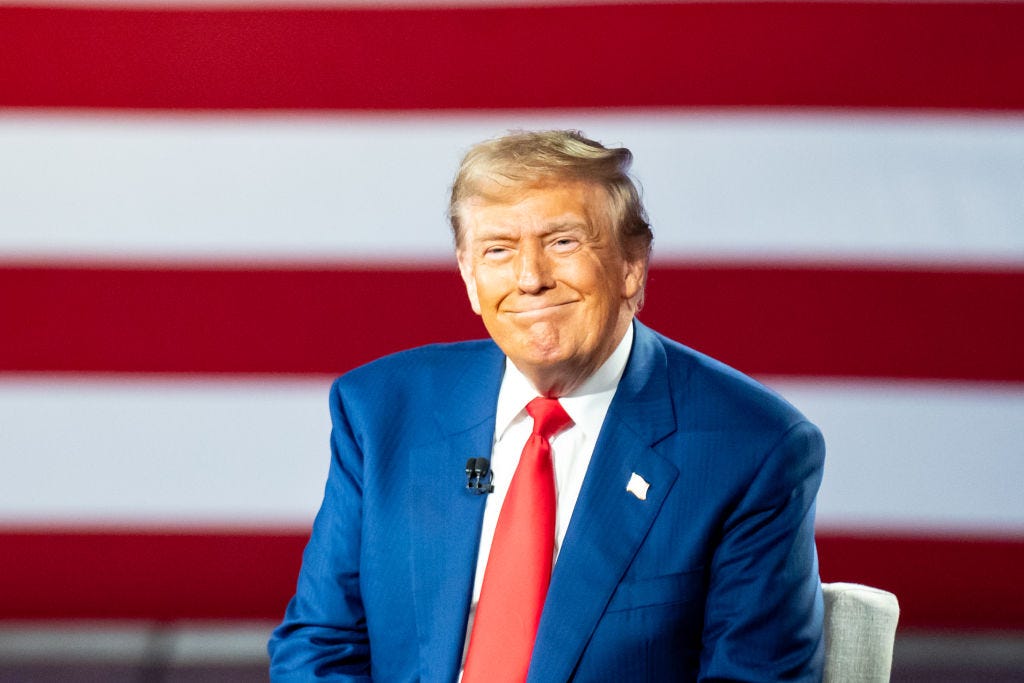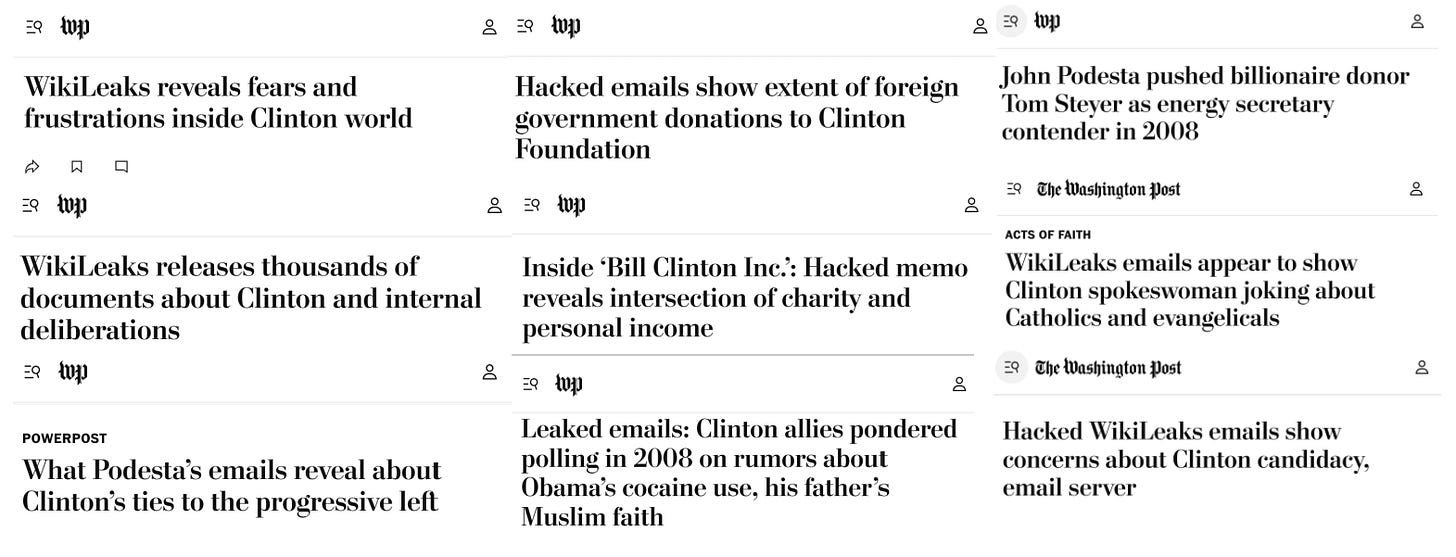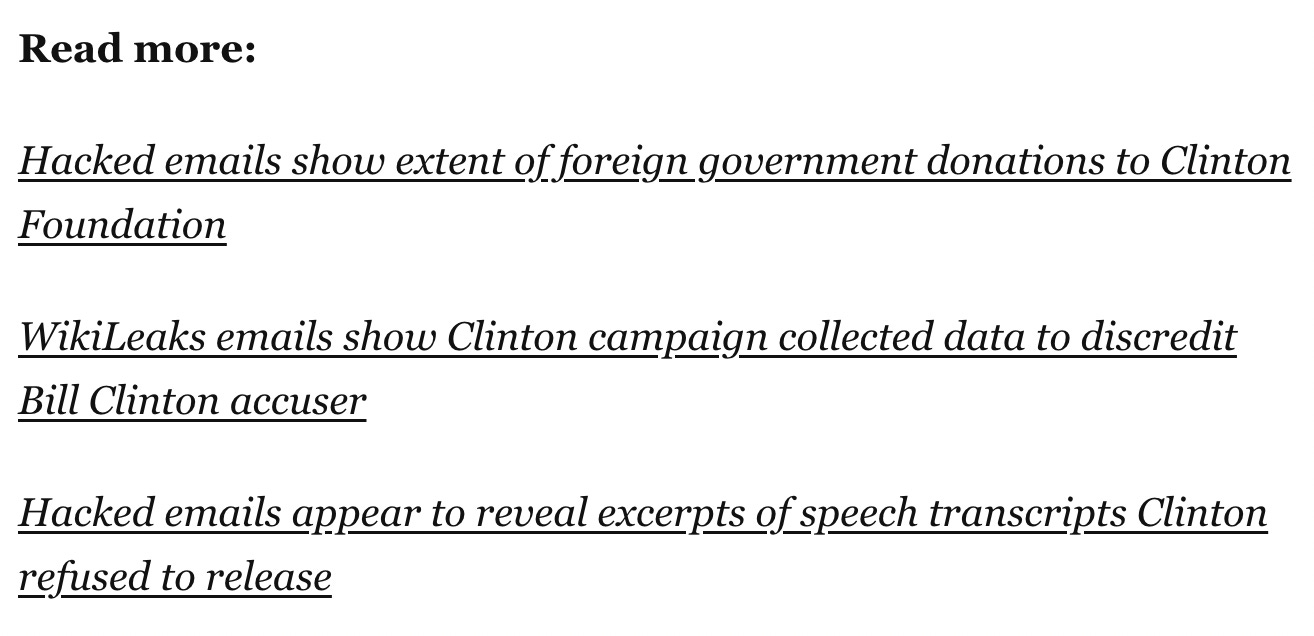Major outlets change standards for hacked emails, protect Trump

For weeks, major American media organizations — including The Washington Post, Politico, and the New York Times — have possessed internal Trump campaign documents. What do these documents say? We don't know because all three outlets have declined to publish the documents — or excerpt a single sentence.
None of the outlets even acknowledged that they had been sent the internal documents until after the Trump campaign publicized that it had been hacked by the Iranian government. Little has been revealed about the topics covered in the documents other than that they include a dossier exploring the vulnerabilities of Senator J.D. Vance (R-OH), who former President Donald Trump chose as his running mate.
Trump campaign spokesman Steven Cheung demanded the media keep the internal documents secret. "[A]ny media or news outlet reprinting documents or internal communications are doing the bidding of America’s enemies and doing exactly what they want," Cheung said in an August 10 statement.
Over the weekend, U.S. intelligence officials "acknowledged for the first time that the Iranian government was behind not only the hack of the Trump campaign revealed last month but also the leak of internal campaign documents." The acknowledgment was consistent with an August 8 press release from Microsoft, which did not name the Trump campaign, warning of operations by the Iranian government "designed to gain intelligence on political campaigns."
Washington Post Executive Editor Matt Murray defended the decision of the Washington Post and other outlets not to publish the leaked internal Trump campaign documents. "[A]ll of the news organizations in this case took a deep breath and paused, and thought about who was likely to be leaking the documents, what the motives of the hacker might have been, and whether this was truly newsworthy or not," Murray said in a statement to a Washington Post reporter.
This is a much different approach than the Washington Post took after hackers connected to the Russian government leaked internal emails from Clinton campaign officials and the Democratic National Committee (DNC). The Washington Post published dozens of stories based on these leaked emails. The steady drumbeat of mostly unflattering articles was a major part of the election narrative in the days and weeks before election day.
At the end of these articles, the Washington Post often directed readers to more of its extensive coverage of the hacked materials.
Nor was the coverage limited to information that "was truly newsworthy." Any tidbit of information was fair game for coverage. One Washington Post article discussed Clinton campaign chair John Podesta's risotto recipe.
“The risotto, fish and salad were marvelous,” law professor Bob Mnookin emailed.
“Why do I use a 1/4 or 1/2 cup of stock at a time?” emailed former Clinton staffer Peter Huffman with the subject line “risotto.”
Podesta must be the risotto king of Washington. His response to Huffman: “The slower add process and stirring causes the rice to give up its starch, which gives the risotto its creamy consistency.”
(Disclosure: The author of this article previously worked with Podesta at the Center for American Progress and exchanged emails with Podesta that were leaked.)
Similarly, Politico spokesman Brad Dayspring said that Politico "made a judgment" and decided not to publish any of the leaked Trump materials because "questions surrounding the origins of the documents and how they came to our attention were more newsworthy than the material that was in those documents."
Politico made a different judgment in 2016. In addition to numerous standalone articles about the hacked materials from the DNC and Clinton campaign officials, Politico published a "live blog" to highlight the minutiae in the stolen emails.
The live blog included 50 entries published over less than three weeks. A Politico columnist devoted an entire piece bemoaning that, in a private email, Podesta once called him a "prick." Another article dissected the leaked emails to explain how Clinton aide Huma Abedin acted as "a resource to explain the multiple layers of Clinton’s world."
The New York Times has refused to comment on its decision not to cover the contents of any of the leaked Trump documents, telling CNN that it "doesn’t discuss editorial decisions about ongoing coverage."
The New York Times' approach was quite different in 2016, when it published at least 199 articles about the stolen DNC and Clinton campaign emails between the first leak in June 2016 and Election Day. The coverage of the emails was overwhelmingly negative.
The New York Times Editorial Board wrote that any negative impact on the Clinton campaign was Hillary Clinton's fault for not voluntarily releasing the information contained in the emails. "Imagine if months ago, Mrs. Clinton had done her own giant information release," the New York Times Editorial Board wrote on October 22. "[E]veryone would have long since moved on."
Of course, the Washington Post, Politico, and the New York Times may believe they made a mistake in covering the hacked emails in 2016 and are now changing course. But none of these publications have acknowledged any errors in their 2016 coverage or acknowledged that they are taking a radically different approach to leaked internal Trump campaign documents in 2024.
In any event, Trump is an odd beneficiary for the media's change of heart on hacked campaign materials. On July 26, 2016, Trump publicly implored Russia to acquire Hillary Clinton's internal emails, promising that the media would amplify them. "Russia, if you’re listening, I hope you’re able to find the 30,000 emails that are missing, I think you will probably be rewarded mightily by our press," Trump said. (It was later revealed that Russia began targeting Clinton campaign officials "on or around" the same day.)
When Wikileaks began leaking the emails acquired by Russian hackers, Trump celebrated. He publicly mentioned WikiLeaks 141 times in the month before the election. "WikiLeaks, I love WikiLeaks," Trump told a crowd in Pennsylvania on October 10. A few weeks later, he won the state by less than 50,000 votes, propelling him to the White House.





Outrageous. I canceled my NYT subscription a couple of weeks ago and will cancel my WaPo subscription today. Last straw.
I just wrote a letter to the editor to the WaPo using their form.
I don't even care about the hacked information -- it's the hypocrisy of having to hear about Hillary's emails, Hunter Biden's laptop and Ashley Biden's diary.
Publish it you cowards.